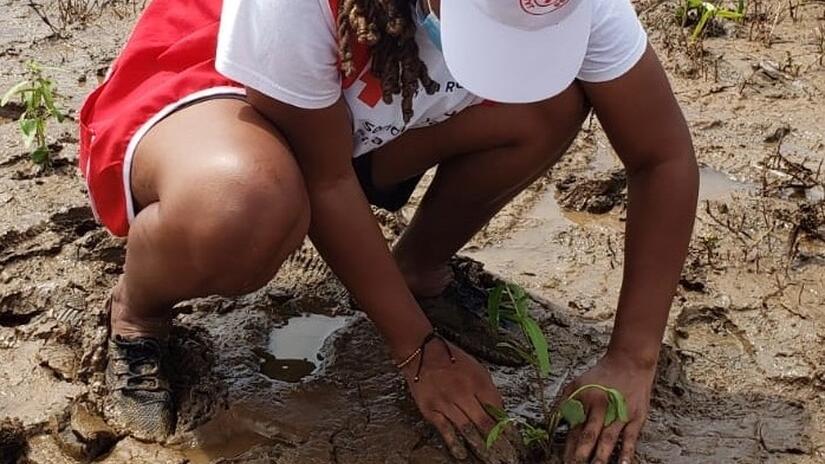The IFRC launched its Global Climate Resilience Platform (GCRP) last year at COP27 with the objective of raising CHF 1 billion in next five years to boost locally-led climate action.
In its first year, the Platform has mobilized CHF 100 million, providing programming on three focus areas – anticipatory action and early warning, nature-based solutions and shock- responsive social protection – in 33 of the world’s most climate vulnerable countries.
Increased investments in anticipatory action and early warning, nature-based solutions and shock-responsive social protection have the potential for transformational change if coupled with unprecedented levels of investment at the local level.
Anticipatory action and early action means taking steps to protect people before a crisis hits, based on forecasts or predictions, to prevent or reduce potential disaster impacts. These types of actions vary from evacuation plans, cash distribution or reinforcement of homes.
Nature-based solutions are actions to protect, sustainably manage or restore ecosystems — such as forests, mangroves, coral reefs or urban green spaces — in ways that addresses societal challenges, such as disaster risk, climate change or food security.
The role of shock-responsive social protection or safety nets is to reduce vulnerability to poverty and reliance on negative coping strategies. Such measures include adaptative livelihoods, health and social support and inclusive disaster preparedness and response.
“This is exactly the kind of solidarity we need to have with communities and organizations like National Societies that locally rooted, in their efforts to prevent and reduce risks so everyone has the chance to thrive, instead of only working to recover from great losses,” said IFRC Secretary General Jagan Chapagain, who announced additional funding pledge while at COP28 Climate Summit in Dubai, UAE today.
“Just as we must mobilize on the global level to address the causes of climate change, we must also help communities adapt,” he continued. “The Global Climate Resilience Platform offers a great opportunity to do something very concrete and positive that will save lives, livelihoods and even entire communities from the worsening impacts of the climate crisis.”
Approach adapted to local threats
While the platforms prioritizes early action, nature-based solutions and shock-responsive social protection, the activities will vary depending on the particular climate risks communities face.
In some cases, early action means planned evacuations or reinforcing homes. In others, it may mean distributing health protection kits, or in the case of heatwaves, setting up mobile cooling centres.
In the Americas, where climate change has increased the frequency and intensity of extreme weather related events – from tropical storms to mudslides, floods and wildfires – the GCRP helps National Societies develop or improve solutions that address those particular risks.
In drought-impacted countries in eastern Africa, the GCRP supports National Societies working to help communities adapt through the development integrated water systems and participate in multi-partner initiatives such as The Water at the Heart of Climate Action programme.
Across the globe, in countries including Kenya and Nepal, shock responsive social protection has meant including anticipatory work into the national government’s social protection system. This means more people get access to timely information and support.
National Societies that participate will integrate these approaches into their institutional planning, priorities and funding strategies. The GCRP will back up these efforts by reinforcing National Society technical expertise through training and operational support.
The countries benefitting from GCRP funding thus far include :
Africa: Benin, Burkina Faso, Burundi, Cameroon, Côte d’Ivoire, Democratic Republic of Congo, Eswatini, Ethiopia, Ghana, Kenya, Madagascar, Malawi, Mauritania, Mozambique, Namibia, Nigeria, Rwanda, Somali, South Sudan, Sudan, Tanzania and Uganda
Americas: Colombia, Dominican Republic and Jamaica
Asia-Pacific: Bangladesh, Indonesia, Mongolia, Pakistan, Philippines and Vietnam
MENA: Iraq, Palestine, Syria and Yemen.
With the exception of Rwanda, all the participating countries are considered the 100 most climate vulnerable countries according to ND-GAIN Index, an initiative by the University of Notre Dame, in the United States, aimed at helping people understand ways communities are adapting to climate change.
For more information, read our technical explainer.
You can also visit our early action page and the Anticipation Hub - our anticipatory action platform hosted by the German Red Cross.

